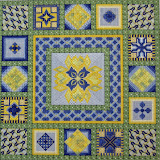Well, the leaves are done, even if they do look dorky. Piercing congress cloth while doing ombre' shading is HARD! I just have to stitch the veins, stems and background in this area. YEAH!!! It's the last area that was covered in the first two-day session. Next weekend we'll learn how to do the rest. I wonder what challenges face us then.
This piece gives meaning to the phrase "blood, sweat and tears." I've sweat bullets doing the leaves and shed tears when I pricked my finger with a chenille needle and a drop of blood fell on a completed leaf.
Saturday, February 27, 2010
Patterns of the Orient - Continued
Labels:
NeedlepointInProgress
Monday, January 25, 2010
Patterns of the Orient
This is a glorious, though challenging, piece from Tony Minieri. It's a study in Chinese, Japanese and Korean textiles. Each area represents a different pattern used in contemporary and ancient fabrics. I think I'm enjoying it ... some days it's way over my head.
Labels:
NeedlepointInProgress
Monday, October 26, 2009
Ways to Improve Your Stitching
Here are a few simple suggestions for improving your stitching. More to come in the days ahead.
- Use a new needle for each project. The plating on tapestry needles wears off amazingly fast. If the plating is gone, the needle may leave a black mark when you stitch. Metallics and other rough fibers can nick the needle eye. If this happens, it will rough up your threads and will contribute to pilling.
- Use the correct size needle for your canvas. In general, use a size 20 for 13 mesh, 22 for 18 mesh, and 24 for Congress cloth. A slightly larger needle can be used when stitching vertical and horizontal decorative stitches.
- Work from light to dark colors. Fuzzy threads like wool pick up fibers from existing stitches. So, if you've stitched red and then stitch around it in white, the white may pick up little bits of the red, leaving a pink smudge.
- Clip the threads close to your stitching on the back so you don't "pick them up" when you stitch the next area.
- For best results, stitch on a frame. Stretcher bars and scroll bars keep the canvas taut so the stitches don't distort the shape of the canvas.
- Work with clean hands.
- Protect your work from animals, spills, and other accidents.
- Work in the best light you can manage.
- Choose to stitch only things you're crazy about. There's nothing worse than dreading a project because you don't like the design.
- Try something new. Take classes. Try new threads, new stitches, new techniques. If you always stitch painted canvas, try a charted design. If you always stitch from charts, try a painted canvas. Try blackwork, Japanese embroidery, bargello, goldwork, stumpwork.
Labels:
Tips
Monday, September 07, 2009
Almost Done!

IT'S DONE and off to the finisher! Whew! Still worried about the beard being too fluffy. But, Lila won't care ... Santa will be very generous this year, to be sure.
Labels:
NeedlepointInProgress
Sunday, August 23, 2009
Ribbons of Hope
 This piece by Laura Perrin is a beauty! The foundation color is a new Watercolours called Primrose. Complementing this is a selection of Perle cottons, Neon Rays +, Petite Treasure Ribbon and gold beads. I'm planning to teach it in October, which is Breast Cancer Awareness month. A donation toward breast cancer research will be made for each student taking the class. Note the "pink" ribbons in the three large ribbons.
This piece by Laura Perrin is a beauty! The foundation color is a new Watercolours called Primrose. Complementing this is a selection of Perle cottons, Neon Rays +, Petite Treasure Ribbon and gold beads. I'm planning to teach it in October, which is Breast Cancer Awareness month. A donation toward breast cancer research will be made for each student taking the class. Note the "pink" ribbons in the three large ribbons.
Labels:
Completed Projects
Monday, August 10, 2009
IT'S FINISHED!

July was a productive month! I FINALLY, FINALLY finished stitching this piece taught by Tony Minieri at a Chicago ANG workshop three years ago. Still not happy with the clouds, but they're the best I could do.
In July I also finished the Heart-to-Heart design of the four red and gold dresses on black Congress cloth, a Christmas ornament, and put the finishing touches on two other projects.
Now I can get busy on a new piece called Ribbons of Hope, finish an ornament that's been in the works for a few months, and look for new projects. I'm declaring some UFO's NTBD's (never to be dones), which eases the guilt over what's left.
Labels:
Completed Projects
Subscribe to:
Posts (Atom)






